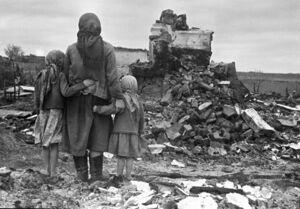War (nonfiction): Difference between revisions
| Line 20: | Line 20: | ||
<gallery mode="traditional"> | <gallery mode="traditional"> | ||
Victim_of_Nazi_inhumanity_still_rests_in_the_position_in_which_he_died,_attempting_to_rise_and_escape.jpg|link=Man's inhumanity to man (nonfiction)|This victim of Nazi inhumanity still rests in the position in which he died, attempting to rise and escape his horrible death. See [[Man's inhumanity to man (nonfiction)|Man's Inhumanity to Man]]. | File:Victim_of_Nazi_inhumanity_still_rests_in_the_position_in_which_he_died,_attempting_to_rise_and_escape.jpg|link=Man's inhumanity to man (nonfiction)|This victim of Nazi inhumanity still rests in the position in which he died, attempting to rise and escape his horrible death. See [[Man's inhumanity to man (nonfiction)|Man's Inhumanity to Man]]. | ||
File:Looking for wounded under protection of white flag 1916.jpg|Looking for wounded under protection of white flag (1916). | File:Looking for wounded under protection of white flag 1916.jpg|Looking for wounded under protection of white flag (1916). | ||
</gallery> | </gallery> | ||
Revision as of 07:27, 12 June 2016
War is a state of armed conflict between societies.
Description
It is generally characterized by extreme collective aggression, destruction, and usually high mortality. An absence of war is usually called "peace".
Total war is warfare that is not restricted to purely legitimate military targets, and can result in massive civilian or other non-combatant casualties.
While some scholars see war as a universal and ancestral aspect of human nature, others argue that it is only a result of specific socio-cultural or ecological circumstances.
In 2013 war resulted in 31,000 deaths down from 72,000 deaths in 1990.
The deadliest war in history, in terms of the cumulative number of deaths since its start, is the Second World War, from 1939 to 1945, with 60–85 million deaths, followed by the Mongol conquests which was greater than 41 million.
War usually results in significant deterioration of infrastructure and the ecosystem, a decrease in social spending, famine, large-scale emigration from the war zone, and often the mistreatment of prisoners of war or civilians.
Another byproduct of some wars is the prevalence of propaganda by some or all parties in the conflict, and increased revenues by weapons manufacturers.
Nonfiction cross-reference
This victim of Nazi inhumanity still rests in the position in which he died, attempting to rise and escape his horrible death. See Man's Inhumanity to Man.
External links
- War @ Wikipedia


